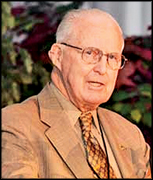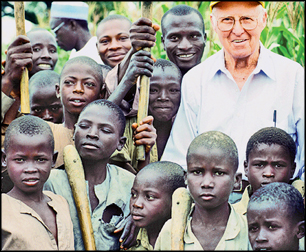|
Dr. Norman Borlaug:
Scientist and humanist
Dr. Norman Borlaug, the greatest hunger
fighter warned against complacency, that ‘the battle to ensure food
security for hundreds of millions of miserably poor people is far from
won.’
I had the privilege of knowing and working with Norman Borlaug - who
has been aptly described by the Nobel Peace Prize Committee as the
greatest hunger fighter of our time - for nearly 50 years. I first heard
him in 1953 outline an innovative strategy for combating wheat rusts at
the University of Wisconsin, Madison.
From 1963, he visited India in March every year to see the wheat
crop. During his extensive travels by road, he used to stop frequently,
talk to the farmers, and examine the state of the health of the plants.
Plants and farmers became his life-long friends and companions.
Eliminating the wheat rust menace became his unrelenting mission.
|
Profile of a humanist
 Norman
Ernest Borlaug was born on March 25, 1914. He was an
American agronomist, humanitarian, and deemed the father of
the Green Revolution. Borlaug was one of only six people to
have won the Nobel Peace Prize, the Presidential Medal of
Freedom and the Congressional Gold Medal.He was also a
recipient of the Padma Vibhushan, India’s second-highest
civilian honour. Borlaug’s discoveries have been estimated
to have saved over one billion lives worldwide. Norman
Ernest Borlaug was born on March 25, 1914. He was an
American agronomist, humanitarian, and deemed the father of
the Green Revolution. Borlaug was one of only six people to
have won the Nobel Peace Prize, the Presidential Medal of
Freedom and the Congressional Gold Medal.He was also a
recipient of the Padma Vibhushan, India’s second-highest
civilian honour. Borlaug’s discoveries have been estimated
to have saved over one billion lives worldwide.
He was awarded the Nobel
Peace Prize in 1970 in recognition of his contributions to
world peace through increasing food supply.
Courtesy: Wikipedia
|
Dr. Borlaug started his research career in agriculture in Mexico at a
time when the world was passing through a serious food crisis. During
1942-1943, nearly two million people died of hunger during the Great
Bengal Famine. China also experienced widespread and severe famine
during the 1950s. Famines were frequent in Ethiopia, the Sahelian region
of Africa, and many other parts of the developing world. It was in this
background that Dr. Borlaug decided to look for a permanent solution to
recurrent famines by harnessing science to increase the productivity,
profitability, and sustainability of small farms.
The work he did in Mexico during the 1950s in breeding semi-dwarf,
rust-resistant wheat varieties and its extension to India, Pakistan, and
other countries during the 1960s brought about a total transformation in
the atmosphere for the possibility of achieving a balance between human
numbers and the human capacity to produce food. Developing nations
gained in self-confidence in their agricultural capability. He disproved
prophets of doom like Paul and William Paddock and Paul and Anne Ehrlich
- who even advocated the application of the ‘triage’ principle in the
selection of countries that should and should not be saved from
starvation through American assistance.
The introduction of Mexican semi-dwarf varieties of wheat in India in
the early 1960s not only helped improve wheat production but also led to
the union of brain and brawn in rural areas.
A revolution
The enthusiasm generated by the new technology can be glimpsed in the
following extract from an article I wrote in 1969 for an Indian
magazine: “Brimming with enthusiasm, hard-working, skilled and
determined, the Punjab farmer has been the backbone of the revolution.
Revolutions are usually associated with the young, but in this
revolution, age has been no obstacle to participation. Farmers, young
and old, educated and uneducated, have easily taken to the new agronomy.
It has been heart-warming to see young college graduates, retired
officials, ex-armymen, illiterate peasants and small farmers queuing up
to get the new seeds. At least in the Punjab, the divorce between
intellect and labour, which has been the bane of our agriculture, is
vanishing.”
The five principles Dr. Borlaug adopted in his life were (to use his
own words): give your best; believe you can succeed; face adversity
squarely; be confident you will find the answers when problems arise;
then go out and win some bouts.
These principles have shaped the attitude and action of thousands of
young farm scientists across the world. He applied these principles in
the field of science and agricultural development, but I guess he
developed them much earlier in the field of wrestling, judging from his
induction into the Iowa Wrestling Hall of Fame in 2004.
Spectacular results
Having made a significant contribution to shaping the agricultural
destiny of many countries in Asia and Latin America, Dr. Borlaug turned
his attention to Africa in 1985. With support from President Jimmy
Carter, Ryoichi Sasakawa, Yohei Sasakawa and the Nippon Foundation, he
organized the Sasakawa-Global 2000 program.
Numerous small-scale farmers were helped to double and triple the
yield of maize, rice, sorghum, millet, wheat, cassava and grain legumes.
 |
|
Dr. Norman
Borlaug being loved by all |
Unfortunately, such spectacular results in demonstration plots did
not lead to significant production gains at the national level, owing to
lack of infrastructure such as irrigation, roads, seed production, and
remunerative marketing systems.
The blend of professional skill, political action, and farmers’
enthusiasm needed to ignite another Green Revolution as in India was
lacking in Africa at that time.
Concerned with the lack of adequate recognition for the contributions
of farm and food scientists, Dr. Borlaug had the World Food Prize
established in 1986, which he hoped would come to be regarded as the
Nobel Prize for food and agriculture. My research centre in Chennai,
India [the M.S. Swaminathan Research Foundation] is the child of the
first World Food Prize I received in 1987. Throughout his professional
career, Dr. Borlaug spent time in training young scholars and
researchers. This led him to promote the World Food Prize Youth
Institute and its program to help high school students work in other
countries to widen their understanding of the human condition. This
usually became a life-changing experience for them.
Freedom from hunger
Norman Borlaug’s repeated message that there was no time to relax
until hunger became history will be heard so long as a single person is
denied the opportunity for a healthy and productive life because of
malnutrition.
Norman Borlaug was a remarkable man who was supported by a remarkable
family - wife Margaret, son William, and daughter Jeanie.
To my mind, Margaret who died in 2007 is the unsung heroine of the
Green Revolution. Without her unwavering support, Dr. Borlaug might not
have accomplished nearly so much in his long and demanding career.
Dr. Borlaug was not only a great scientist but also a humanist full
of compassion and love for fellow human beings, irrespective of race,
religion, colour, or political belief. This is clear from his last
spoken words on the night of Saturday, September 12, 2009. Earlier in
the day, a scientist showed him a nitrogen tracer developed for
measuring soil fertility. His last words were “Take the tracer to the
farmer.” This life-long dedication to taking scientific innovation to
farmers without delay set Dr. Borlaug apart from most other farm
scientists carrying out equally important research.
He pointed out that between 1960 and 2000, the proportion of “the
world’s people who felt hunger during some portion of the year had
fallen from about 60 percent to 14 percent.”
But the latter figure still “translates into 850 million men, women
and children who lack sufficient calories and protein to grow strong and
healthy bodies.” So he added: “The battle to ensure food security for
hundreds of millions of miserably poor people is far from won.”
This is the unfinished task Norman Borlaug leaves scientists and
political leaders worldwide. It will be appropriate for the Norman
Borlaug Institute for International Agriculture to become the flagship
of the movement for a world without hunger.
This article is based on the Norman Borlaug memorial address given by
the author at the Rudder Auditorium, Texas A&M University, U.S.
- The Hindu
|



